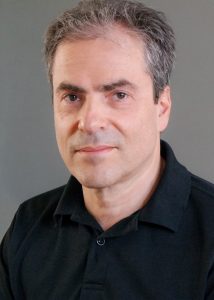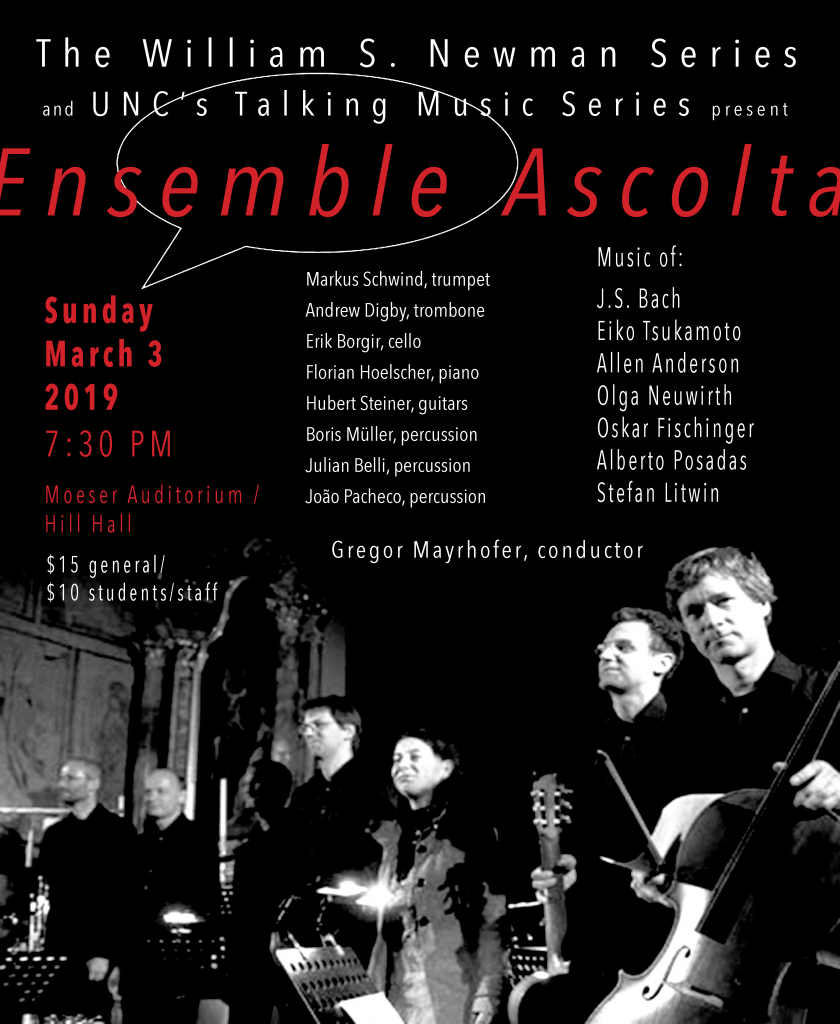by Catherine Zachary

On March 3, at 7:30 pm in Moeser Auditorium the Ensemble Ascolta will present a program of new music on familiar themes with a modern perspective, curated by UNC Music Professor Stefan Litwin.
“New music, since its inception in turn of the century Vienna, with Schoenberg really making that first step toward atonality, is a radicalization of language. And that language no longer just reproduces what is known and accepted, but challenges the listener to question his or her own thoughts. And I believe that challenging ones own thoughts is always a good thing,” Litwin says.
Formed in 2003 in Stuttgart, Germany, the Ensemble Ascolta is arguably one of Europe’s leading contemporary music ensembles. The musicians seeks to drive the field of contemporary music forward, always pushing the boundaries and developing new ideas and sounds with fellow composers. For over a decade, the ensemble has commissioned and performed over 250 news works by today’s leading composers. An unusual mix of seven instruments, the ensemble consists of 1 trumpet, 1 trombone, 2 percussion, 1 piano, 1 cello, and 1 guitar.
Having visited UNC Music once before in 2012, Litwin knew the ensemble would be a good fit for the department’s prestigious William S Newman Artists Series. Their visit in 2012 centered around a program of film music at the Varsity Theater, for which composers wrote music to be paired with famous historic films. One such composer was Professor and Chair Allen Anderson who composed a new score to Hans Richter’s “Filmstudie”, which features on the second half of the Ensemble Ascolta’s upcoming program this Sunday. The second half of the program, in fact, centers around film music and will be a multimedia experience for the audience.
“Tonality and the use of tonal means today has been occupied by what is generally referred to as “culture industry” – or one of its more prominent manifestations: Hollywood,” Litwin notes. “The big question is: does the music that you write really represent your own thoughts, or are your thoughts being represented, or dictated rather, by the music you’re writing? And I believe that new music is still the only means by which we can find a way of expressing, truly expressing, ourselves as human beings rather than being expressed through an already existing language, which speaks us rather than us speaking it.”
On Sunday night the audience will get to experience familiar images in new ways, finding new connections between tonal and visual cues.
“This kind of film music is all about the connection between the experimental visual layer and experimental sound, the exploration of what becomes possible the moment you abandon the usual narrative film. The new scores, such as Allen Anderon’s, are not just film music, but actually a congenial parallel to these famous films,” says Litwin.
The first half of the program then centers not on visual and auditory narratives, but on our ever-changing relationship to familiar repertoire, particularly that of Robert Schumann. It features two works, Anklänge an Robert Schumann (2015), for piano solo by Alberto Posadas (b. 1967) and Kinderszenen (2018), for 8 players and sampler by Litwin.
Almost 10 years ago, the radio station SWR Stuttgart commissioned Litwin to compose a piece for the group. In 2018, Litwin’s new piece, Kinderszenen, was finally completed and the world premiere took place this past summer in Stuttgart. The composition was met with great acclaim and will be recorded soon after the American premiere performance here this Sunday.
Litwin had been playing Schumann’s piano cycle Kinderszenen, or Scenes of Childhood, pieces for himself and reading a book by Uruguayan author Eduardo Gagliano about the cruel reality for many children living in the Third World today. According to UNESCO, “there are up to 150 million street children in the world today. Chased from home by violence, drug and alcohol abuse, the death of a parent, family breakdown, war, natural disaster or simply socio-economic collapse, many destitute children are forced to eke out a living on the streets, scavenging, begging, hawking in the slums and polluted cities of the developing world.”
This struck a significant chord with Litwin, “Here I was playing these pieces that suggest a secure child’s world, and from that came the idea of relocating the Schumann into the political reality of today. And that, of course, is a huge musical challenge, how do you do it? So I started playing around with the actual themes of Schumann that represent those themes, and began transforming them.”
Litwin relocates the listener from a secure 19th-century bourgeois childhood into the slums and streets that so many children experience today. Schumann’s titles such as “Tangled Dreams” that spoke of sleepy, but exciting images, to Schumann now translate to the hallucinations of a glue-sniffing child, and the dark fairytale of the boogeyman has come to life as the paramilitary groups that hunt for children in slums. Litwin challenges the listener to grapple with these harsh realities instead of being swept away by a false nostalgia, that perhaps never really existed at all when one considers the slums and child labor of Schumann’s time.
Throughout Litwin’s piece, there is one theme that consistently returns.
“There’s a famous piece by Schumann with just the simple title “Why?”, and that piece returns in my piece many times It’s sort of an internal critical voice. Why do we tolerate this? And in order to relocate this piece even more strongly, I’ve included sounds from the real world – shots being fired, car sirens, street children laughing, crying.”
Litwin’s final thoughts on the concert this Sunday evening? “Don’t miss it.”
Ensemble Ascolta | Sunday, March 3 | 7:30 pm | Moeser Auditorium
Want to know more about the curator, composers, and performers on Sunday nights concert? Click on the linked names below.

